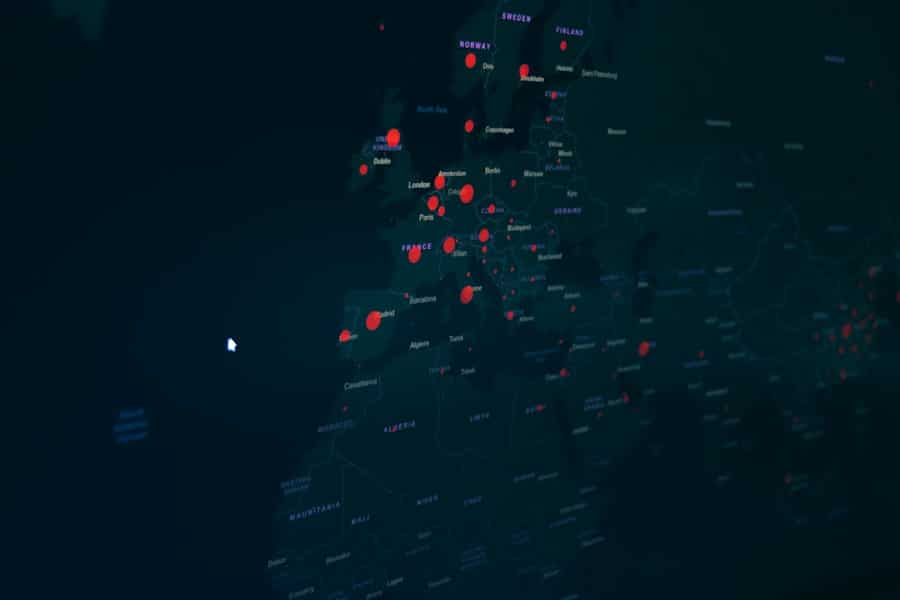Smart contracts represent a revolutionary advancement in the realm of digital transactions, leveraging blockchain technology to automate and enforce agreements without the need for intermediaries. These self-executing contracts contain the terms of the agreement directly written into code, allowing for a seamless execution of contractual obligations once predetermined conditions are met.
By eliminating the need for third-party verification, smart contracts promise increased efficiency, reduced costs, and enhanced security in various sectors, including finance, supply chain management, and real estate. The operational mechanics of smart contracts hinge on their ability to execute automatically when specific conditions are satisfied. For instance, in a real estate transaction, a smart contract could be programmed to transfer ownership of a property once payment is confirmed on the blockchain.
This automation not only accelerates the transaction process but also minimizes the potential for disputes, as the terms are transparently encoded and immutable. However, while smart contracts offer numerous advantages, they are not without their challenges. Issues such as coding errors, lack of legal recognition in certain jurisdictions, and the complexities of integrating with existing legal frameworks can pose significant hurdles.
As the technology matures, the integration of artificial intelligence (AI) into smart contract monitoring emerges as a promising solution to enhance their reliability and effectiveness.
Key Takeaways
- Smart contracts are self-executing contracts with the terms of the agreement directly written into code.
- AI plays a crucial role in monitoring smart contracts by analyzing large volumes of data and identifying potential issues or anomalies.
- AI-enabled smart contract monitoring offers benefits such as increased efficiency, accuracy, and cost savings.
- Challenges and risks of AI-enabled smart contract monitoring include potential biases in AI algorithms and security vulnerabilities.
- Real-world applications of AI-enabled smart contract monitoring include supply chain management, insurance claims processing, and financial transactions.
The Role of AI in Smart Contract Monitoring
Artificial intelligence plays a pivotal role in enhancing the monitoring and management of smart contracts by providing advanced analytical capabilities that can identify anomalies, ensure compliance, and optimize performance. Traditional monitoring methods often fall short in addressing the dynamic nature of smart contracts, particularly as they interact with various external data sources and systems. AI algorithms can analyze vast amounts of data in real-time, enabling stakeholders to gain insights into contract performance and detect potential issues before they escalate into significant problems.
For example, machine learning models can be trained to recognize patterns in contract execution and flag deviations from expected behavior, thereby facilitating proactive management. Moreover, AI can enhance the security of smart contracts by identifying vulnerabilities that could be exploited by malicious actors. By employing techniques such as natural language processing (NLP), AI systems can parse through legal documents and code to ensure that all terms are correctly implemented and that there are no loopholes that could lead to exploitation.
This capability is particularly crucial in environments where smart contracts are used for high-stakes transactions, such as financial services or healthcare. The integration of AI into smart contract monitoring not only improves operational efficiency but also instills greater confidence among users regarding the integrity and reliability of these automated agreements.
Benefits of AI-Enabled Smart Contract Monitoring

The incorporation of AI into smart contract monitoring offers a multitude of benefits that significantly enhance the overall functionality and reliability of these digital agreements. One of the most notable advantages is the ability to conduct real-time monitoring and analysis. Traditional methods often rely on periodic audits or manual checks, which can lead to delays in identifying issues or discrepancies.
In contrast, AI-enabled systems can continuously monitor contract performance against predefined metrics, providing stakeholders with immediate feedback and insights. This real-time capability allows for swift corrective actions, minimizing potential losses and ensuring that contractual obligations are met promptly. Another significant benefit is the enhancement of compliance and risk management.
AI algorithms can be programmed to understand regulatory requirements and industry standards relevant to specific contracts. By continuously analyzing contract execution against these criteria, AI systems can alert stakeholders to potential compliance breaches or risks associated with contract performance. For instance, in industries such as finance or healthcare, where regulatory compliance is paramount, AI-enabled monitoring can help organizations avoid costly penalties and reputational damage by ensuring adherence to legal requirements.
Furthermore, this proactive approach to risk management fosters a culture of accountability and transparency among all parties involved in the contract.
Challenges and Risks of AI-Enabled Smart Contract Monitoring
Despite the numerous advantages associated with AI-enabled smart contract monitoring, several challenges and risks must be addressed to fully realize its potential. One primary concern is the reliance on data quality and availability. AI systems require vast amounts of accurate data to function effectively; however, if the data fed into these systems is flawed or incomplete, it can lead to erroneous conclusions and decisions.
For example, if an AI model is trained on historical data that does not accurately reflect current market conditions or regulatory changes, it may fail to identify critical risks or compliance issues. Additionally, there are inherent risks associated with the use of AI algorithms themselves. The “black box” nature of many machine learning models can make it difficult for stakeholders to understand how decisions are made or why certain actions are recommended.
This lack of transparency can lead to mistrust among users who may be hesitant to rely on automated systems for critical decision-making processes. Furthermore, as AI technologies evolve, there is a growing concern about potential biases embedded within algorithms that could disproportionately affect certain groups or outcomes. Addressing these challenges requires ongoing collaboration between technologists, legal experts, and industry stakeholders to ensure that AI-enabled monitoring systems are both effective and equitable.
Real-world Applications of AI-Enabled Smart Contract Monitoring
AI-enabled smart contract monitoring has already begun to find applications across various industries, demonstrating its versatility and effectiveness in enhancing contract management processes. In the financial sector, for instance, banks and financial institutions are increasingly adopting smart contracts for automating loan agreements and trade settlements. By integrating AI monitoring tools, these organizations can ensure compliance with regulatory requirements while simultaneously optimizing transaction speeds and reducing operational costs.
For example, an AI system could monitor loan agreements in real-time to flag any deviations from agreed-upon terms or identify potential defaults based on borrower behavior patterns. In supply chain management, AI-enabled smart contract monitoring is being utilized to enhance transparency and traceability throughout the logistics process. Companies can deploy smart contracts that automatically execute payments upon delivery confirmation while using AI algorithms to monitor shipment conditions and timelines.
This application not only streamlines operations but also fosters trust among supply chain partners by ensuring accountability at every stage of the process.
Future Trends in AI-Enabled Smart Contract Monitoring

Blockchain Interoperability and Complex Smart Contracts
One notable trend is the increasing integration of blockchain interoperability solutions that allow different blockchain networks to communicate with one another seamlessly. This development will enable more complex smart contracts that can leverage data from multiple sources across various platforms.
Ethical AI Practices and Transparency
Consequently, AI monitoring systems will need to adapt to handle this increased complexity while maintaining accuracy and reliability. Another trend is the growing emphasis on ethical AI practices within smart contract monitoring frameworks. As organizations become more aware of the potential biases and ethical implications associated with AI technologies, there will be a push for greater transparency and accountability in algorithm development and deployment.
Explainable AI and Industry Standards
This shift may lead to the establishment of industry standards and best practices aimed at ensuring fairness in AI-enabled decision-making processes related to smart contracts. Additionally, advancements in explainable AI (XAI) will likely play a crucial role in enhancing user trust by providing insights into how algorithms arrive at specific conclusions.
Regulatory and Legal Implications of AI-Enabled Smart Contract Monitoring
The intersection of AI technology and smart contracts raises important regulatory and legal considerations that must be addressed as these innovations become more prevalent. One key issue is the legal recognition of smart contracts themselves; while many jurisdictions have begun to acknowledge their validity, there remains uncertainty regarding their enforceability in various contexts. As AI-enabled monitoring systems become integral to contract execution and compliance verification, regulators will need to establish clear guidelines outlining how these technologies fit within existing legal frameworks.
Moreover, data privacy concerns are paramount when it comes to AI-enabled smart contract monitoring. The use of personal or sensitive data within these systems necessitates strict adherence to data protection regulations such as the General Data Protection Regulation (GDPR) in Europe or the California Consumer Privacy Act (CCPA) in the United States. Organizations must ensure that their AI monitoring solutions comply with these regulations while also safeguarding user privacy rights.
Failure to do so could result in significant legal repercussions and damage to an organization’s reputation.
The Impact of AI on Smart Contract Monitoring
The integration of artificial intelligence into smart contract monitoring represents a transformative shift in how digital agreements are managed and enforced across various industries. By enhancing real-time oversight capabilities, improving compliance mechanisms, and streamlining operational processes, AI-enabled monitoring systems offer significant advantages over traditional methods. However, as organizations embrace these technologies, they must also navigate the associated challenges and risks while remaining vigilant about regulatory implications.
As we look toward the future, it is clear that ongoing collaboration between technologists, legal experts, and industry stakeholders will be essential in shaping a robust framework for AI-enabled smart contract monitoring. By addressing concerns related to data quality, algorithmic bias, and regulatory compliance proactively, organizations can harness the full potential of this innovative technology while fostering trust among users and stakeholders alike. The impact of AI on smart contract monitoring is poised to redefine how agreements are executed and managed in an increasingly digital world.
If you are interested in exploring the intersection of technology and business, you may also enjoy reading about the best software for social media content in this comprehensive guide. This article delves into the tools and platforms that can help businesses effectively manage their social media presence.
FAQs
What is smart contract monitoring and execution?
Smart contract monitoring and execution refers to the use of artificial intelligence (AI) to track and enforce the terms of a smart contract, which is a self-executing contract with the terms of the agreement directly written into code.
How is AI enabling smart contract monitoring and execution?
AI is enabling smart contract monitoring and execution by providing advanced analytics and automation capabilities to track the performance of smart contracts, identify potential issues, and execute actions based on predefined conditions.
What are the benefits of using AI for smart contract monitoring and execution?
The benefits of using AI for smart contract monitoring and execution include increased efficiency, accuracy, and transparency in contract management, as well as the ability to automate the enforcement of contract terms and conditions.
What are some examples of AI technologies used for smart contract monitoring and execution?
Examples of AI technologies used for smart contract monitoring and execution include machine learning algorithms for predictive analytics, natural language processing for contract analysis, and robotic process automation for automated contract execution.
What are the potential challenges of using AI for smart contract monitoring and execution?
Potential challenges of using AI for smart contract monitoring and execution include data privacy and security concerns, the need for skilled AI professionals to develop and maintain the system, and the risk of algorithmic bias in contract decision-making.

